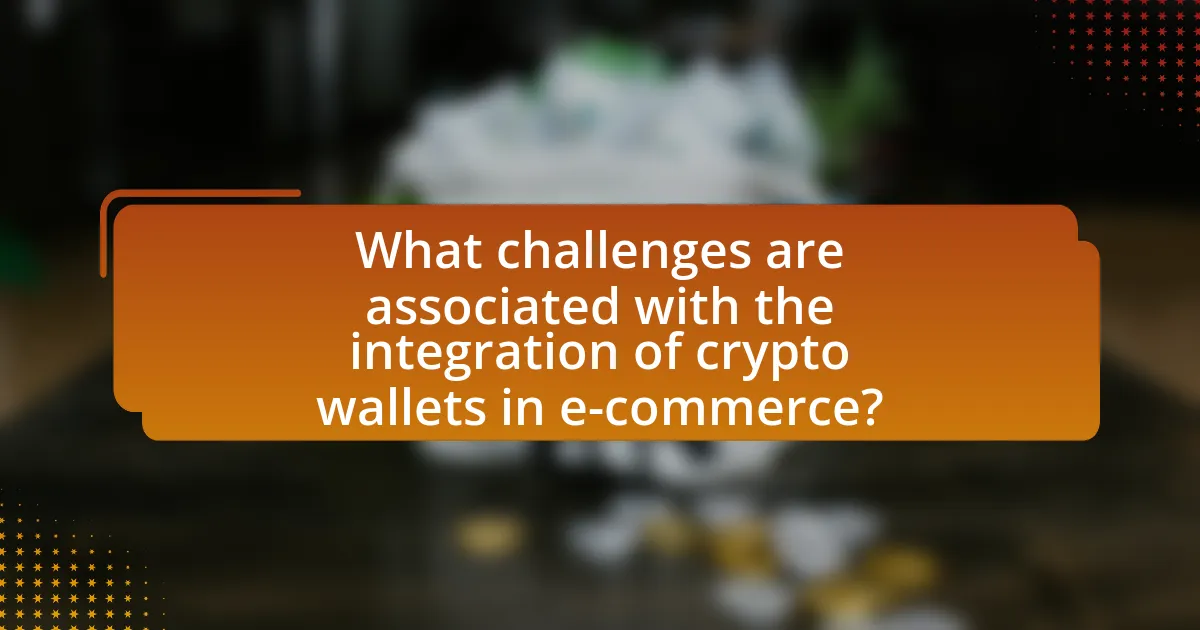The integration of crypto wallets with e-commerce platforms enables customers to make purchases using cryptocurrencies directly from their digital wallets, streamlining the payment process and enhancing transaction speed. This article explores how crypto wallets function within e-commerce ecosystems, their key features, and the security measures they employ to ensure safe transactions. It also discusses the advantages of integrating crypto wallets for businesses, including reduced transaction fees and access to a broader customer base, while addressing challenges such as regulatory compliance and user adoption. Additionally, the article outlines best practices for successful integration and examines future trends in the adoption of crypto wallets in online commerce.

What is the Integration of Crypto Wallets with E-commerce Platforms?
The integration of crypto wallets with e-commerce platforms allows customers to make purchases using cryptocurrencies directly through their digital wallets. This integration streamlines the payment process, enabling faster transactions and reducing reliance on traditional banking systems. According to a report by Statista, the global cryptocurrency market is projected to reach a market capitalization of over $1 trillion, indicating a growing acceptance of digital currencies in commerce. Additionally, platforms like Shopify and WooCommerce have implemented features that support crypto payments, demonstrating the increasing trend of e-commerce businesses adopting this technology to cater to a broader customer base.
How do crypto wallets function within e-commerce ecosystems?
Crypto wallets function within e-commerce ecosystems by enabling secure and efficient transactions using cryptocurrencies. These wallets store private and public keys, allowing users to send and receive digital currencies while ensuring the integrity and security of transactions. For instance, when a customer makes a purchase on an e-commerce platform, the crypto wallet facilitates the transfer of cryptocurrency from the buyer to the seller, often with lower transaction fees compared to traditional payment methods. Additionally, the integration of crypto wallets into e-commerce platforms can enhance user experience by providing instant payment confirmations and reducing chargeback risks, as transactions are irreversible. This functionality is supported by the growing adoption of cryptocurrencies, with a report from Statista indicating that the number of cryptocurrency users worldwide reached over 300 million in 2021, highlighting the increasing relevance of crypto wallets in online commerce.
What are the key features of crypto wallets used in e-commerce?
Crypto wallets used in e-commerce typically feature secure storage, multi-currency support, user-friendly interfaces, and integration capabilities with e-commerce platforms. Secure storage ensures that private keys are protected, often through encryption or hardware solutions, which is crucial for safeguarding digital assets. Multi-currency support allows users to transact with various cryptocurrencies, enhancing flexibility and appeal to a broader customer base. User-friendly interfaces facilitate easy navigation and transaction processes, which is essential for customer satisfaction and retention. Integration capabilities with e-commerce platforms enable seamless transactions, allowing merchants to accept crypto payments efficiently, thereby expanding their payment options and potentially increasing sales.
How do crypto wallets ensure transaction security in e-commerce?
Crypto wallets ensure transaction security in e-commerce by utilizing advanced cryptographic techniques and decentralized ledger technology. These wallets encrypt sensitive information, such as private keys, which are essential for authorizing transactions, thereby preventing unauthorized access. Additionally, transactions are recorded on a blockchain, providing a transparent and immutable ledger that enhances accountability and traceability. This decentralized nature reduces the risk of fraud, as altering transaction data would require consensus across the entire network. Furthermore, many crypto wallets implement multi-signature features, requiring multiple approvals for a transaction, which adds an extra layer of security.
What are the advantages of integrating crypto wallets into e-commerce platforms?
Integrating crypto wallets into e-commerce platforms offers several advantages, including enhanced transaction speed, lower fees, and increased security. Transaction speed is significantly improved as cryptocurrency transactions can be processed almost instantly, unlike traditional banking methods that may take days. Lower fees are another benefit, as crypto transactions often incur minimal processing costs compared to credit card fees, which can be as high as 3% per transaction. Additionally, the use of crypto wallets enhances security through blockchain technology, which provides a decentralized and tamper-proof ledger, reducing the risk of fraud. These advantages contribute to a more efficient and cost-effective shopping experience for consumers and merchants alike.
How does this integration enhance customer experience?
The integration of crypto wallets with e-commerce platforms enhances customer experience by providing faster and more secure payment options. This integration allows customers to complete transactions using cryptocurrencies, which can reduce processing times compared to traditional payment methods. For instance, blockchain technology enables near-instantaneous transactions, minimizing waiting periods for order confirmations. Additionally, the use of crypto wallets enhances security by utilizing advanced encryption techniques, reducing the risk of fraud and chargebacks. According to a report by Statista, 40% of consumers prefer using digital currencies for online purchases due to perceived security benefits. This combination of speed and security significantly improves overall customer satisfaction and trust in the purchasing process.
What financial benefits can e-commerce businesses gain from this integration?
E-commerce businesses can gain significant financial benefits from the integration of crypto wallets, including reduced transaction fees and access to a broader customer base. By accepting cryptocurrencies, businesses often incur lower processing fees compared to traditional payment methods, which can range from 2% to 5%. Additionally, the global nature of cryptocurrencies allows e-commerce platforms to tap into international markets without the complications of currency conversion, thus increasing sales opportunities. A study by Deloitte found that 40% of consumers are willing to use cryptocurrencies for online purchases, indicating a growing demand that can lead to increased revenue for businesses that adopt this payment method.

What challenges are associated with the integration of crypto wallets in e-commerce?
The integration of crypto wallets in e-commerce faces several challenges, including regulatory compliance, security concerns, and user adoption. Regulatory compliance is complex due to varying laws across jurisdictions, which can hinder businesses from accepting cryptocurrencies. Security concerns arise from the risk of hacks and fraud, as crypto transactions are irreversible and can lead to significant financial losses. Additionally, user adoption is limited, as many consumers are unfamiliar with cryptocurrencies and may be hesitant to use them for online purchases. According to a 2022 survey by Statista, only 8% of U.S. consumers reported using cryptocurrencies for online shopping, highlighting the need for increased education and trust in crypto wallets.
What regulatory issues must e-commerce platforms consider?
E-commerce platforms must consider regulatory issues such as compliance with anti-money laundering (AML) laws, consumer protection regulations, data privacy laws, and taxation requirements. Compliance with AML laws is crucial as it helps prevent illicit activities; for instance, the Financial Action Task Force (FATF) guidelines mandate that platforms implement Know Your Customer (KYC) procedures. Consumer protection regulations ensure that customers are treated fairly, which is enforced by various national and international laws. Data privacy laws, such as the General Data Protection Regulation (GDPR) in Europe, require platforms to protect user data and provide transparency about data usage. Additionally, e-commerce platforms must navigate complex taxation requirements related to cryptocurrency transactions, as different jurisdictions have varying rules on how digital currencies are taxed.
How do different jurisdictions affect crypto wallet integration?
Different jurisdictions significantly impact crypto wallet integration by imposing varying regulatory frameworks that dictate how wallets can operate. For instance, in the European Union, the Markets in Crypto-Assets Regulation (MiCA) establishes comprehensive guidelines for crypto assets, influencing how wallets must comply with anti-money laundering (AML) and know your customer (KYC) requirements. In contrast, jurisdictions like El Salvador have adopted a more permissive stance, recognizing Bitcoin as legal tender, which facilitates easier integration of crypto wallets into everyday transactions. These regulatory differences can affect the technical requirements, user experience, and overall adoption of crypto wallets across different regions, as businesses must navigate local laws to ensure compliance and operational viability.
What compliance measures are necessary for e-commerce businesses?
E-commerce businesses must implement several compliance measures, including adherence to data protection regulations, anti-money laundering (AML) laws, and payment card industry standards. Compliance with data protection regulations, such as the General Data Protection Regulation (GDPR) in Europe, ensures that customer data is handled securely and transparently. Anti-money laundering laws require businesses to verify customer identities and report suspicious transactions to prevent illicit activities. Additionally, compliance with the Payment Card Industry Data Security Standard (PCI DSS) is essential for securing payment information and protecting against data breaches. These measures are critical for maintaining trust and legality in the rapidly evolving e-commerce landscape, especially when integrating crypto wallets, which may have additional regulatory scrutiny.
What technical challenges arise during the integration process?
Technical challenges during the integration process of crypto wallets with e-commerce platforms include compatibility issues, security vulnerabilities, and transaction speed limitations. Compatibility issues arise when different blockchain technologies and wallet standards do not align with the e-commerce platform’s existing infrastructure, leading to integration difficulties. Security vulnerabilities are a significant concern, as integrating crypto wallets exposes the platform to potential hacks and fraud, necessitating robust security measures to protect user data and funds. Additionally, transaction speed limitations can hinder user experience, as blockchain transactions may take longer to process compared to traditional payment methods, impacting the overall efficiency of the e-commerce platform.
How can e-commerce platforms ensure seamless wallet integration?
E-commerce platforms can ensure seamless wallet integration by implementing standardized APIs that facilitate communication between the platform and various wallet providers. This approach allows for consistent transaction processing, enabling users to make payments effortlessly. Additionally, adopting robust security protocols, such as encryption and two-factor authentication, enhances user trust and protects sensitive information during transactions. According to a report by Statista, 60% of consumers prefer platforms that offer multiple payment options, including crypto wallets, indicating that seamless integration can significantly improve user experience and increase sales.
What are common technical pitfalls to avoid?
Common technical pitfalls to avoid in the integration of crypto wallets with e-commerce platforms include inadequate security measures, poor user experience, and lack of regulatory compliance. Inadequate security can lead to vulnerabilities, exposing sensitive customer data and funds to theft, as evidenced by the rise in hacking incidents targeting poorly secured platforms. Poor user experience, such as complicated transaction processes or unclear instructions, can deter customers from completing purchases, negatively impacting sales. Additionally, failing to comply with regulations can result in legal penalties and loss of customer trust, as seen in cases where businesses faced fines for not adhering to anti-money laundering laws.

How can e-commerce platforms effectively implement crypto wallet integration?
E-commerce platforms can effectively implement crypto wallet integration by partnering with established payment processors that support cryptocurrency transactions. This approach allows platforms to leverage existing technology and security measures, ensuring a seamless user experience. For instance, companies like BitPay and Coinbase Commerce provide APIs that facilitate easy integration of crypto payments into online stores. Additionally, e-commerce platforms should prioritize user education on cryptocurrency usage and security to enhance customer confidence. According to a 2021 report by Statista, 40% of consumers expressed interest in using cryptocurrencies for online purchases, highlighting the demand for such integrations.
What steps should businesses take to integrate crypto wallets?
Businesses should take the following steps to integrate crypto wallets: first, they must select a suitable crypto wallet provider that aligns with their operational needs and customer preferences. This involves evaluating factors such as security features, supported cryptocurrencies, transaction fees, and user experience.
Next, businesses should ensure compliance with relevant regulations, including Know Your Customer (KYC) and Anti-Money Laundering (AML) requirements, to mitigate legal risks associated with cryptocurrency transactions.
After compliance, businesses need to implement the wallet integration into their e-commerce platform, which typically involves using APIs provided by the wallet service to facilitate transactions.
Finally, businesses should educate their staff and customers about the new payment option, providing clear instructions on how to use the crypto wallet for transactions. This step is crucial for enhancing user adoption and ensuring a smooth transition to accepting cryptocurrency payments.
These steps are validated by the increasing number of e-commerce platforms adopting crypto payments, with a report from Statista indicating that 23% of U.S. consumers have used cryptocurrency for online purchases as of 2023.
How can e-commerce platforms choose the right crypto wallet provider?
E-commerce platforms can choose the right crypto wallet provider by evaluating key factors such as security features, user experience, supported cryptocurrencies, transaction fees, and integration capabilities. Security is paramount; providers should offer robust encryption, two-factor authentication, and a strong track record of safeguarding user funds. User experience is also critical; wallets should have intuitive interfaces that facilitate easy transactions for customers.
Additionally, the range of supported cryptocurrencies is important, as platforms may want to cater to diverse customer preferences. Transaction fees can significantly impact profitability, so comparing fee structures among providers is essential. Finally, seamless integration with existing e-commerce systems and payment gateways ensures a smooth operational flow.
Research indicates that 70% of consumers prefer platforms that accept multiple cryptocurrencies, highlighting the importance of selecting a wallet that supports a wide array of digital currencies.
What best practices should be followed during the integration process?
During the integration process of crypto wallets with e-commerce platforms, it is essential to follow best practices such as ensuring robust security measures, conducting thorough testing, and providing clear user guidance. Implementing strong encryption protocols and secure APIs protects sensitive data, as evidenced by the increasing number of cyberattacks targeting online transactions, which rose by 30% in 2022 according to cybersecurity reports. Additionally, comprehensive testing, including unit, integration, and user acceptance testing, ensures that the integration functions correctly across various scenarios, reducing the risk of failures post-launch. Finally, offering clear documentation and support for users facilitates a smoother transition and enhances user experience, which is critical for adoption rates in the rapidly evolving crypto market.
What are the future trends in crypto wallet integration with e-commerce?
Future trends in crypto wallet integration with e-commerce include increased adoption of decentralized finance (DeFi) solutions, enhanced security measures, and the rise of multi-currency wallets. As e-commerce platforms seek to attract a broader customer base, they are likely to integrate DeFi features that allow for seamless transactions and lending options directly within the shopping experience. Enhanced security measures, such as biometric authentication and advanced encryption, will become standard to protect user data and transactions. Additionally, the popularity of multi-currency wallets will grow, enabling consumers to transact in various cryptocurrencies, thus facilitating cross-border commerce and reducing transaction fees. These trends are supported by the growing number of businesses accepting cryptocurrencies, which reached over 15,000 globally by 2023, indicating a significant shift towards digital currencies in retail.
How might advancements in blockchain technology impact this integration?
Advancements in blockchain technology could significantly enhance the integration of crypto wallets with e-commerce platforms by improving transaction speed, security, and transparency. For instance, the implementation of layer-2 solutions, such as the Lightning Network for Bitcoin, allows for faster transactions by processing them off the main blockchain, thereby reducing congestion and fees. Additionally, enhanced cryptographic techniques can bolster security, making transactions more resistant to fraud and hacking. According to a report by Deloitte, 40% of organizations are exploring blockchain for its potential to streamline operations and enhance security, indicating a strong trend towards adopting these advancements in e-commerce.
What role will customer demand play in shaping future integrations?
Customer demand will be a critical factor in shaping future integrations of crypto wallets with e-commerce platforms. As consumers increasingly seek seamless and secure payment options, e-commerce platforms will prioritize integrating crypto wallets to meet these expectations. A survey by Deloitte in 2022 indicated that 40% of consumers are interested in using cryptocurrencies for online purchases, highlighting a growing trend that businesses must respond to in order to remain competitive. This demand will drive innovations in user experience, security features, and transaction speed, ultimately influencing how e-commerce platforms design their payment systems.
What practical tips can e-commerce businesses follow for successful integration?
E-commerce businesses can achieve successful integration of crypto wallets by ensuring compatibility with multiple wallet types, implementing robust security measures, and providing clear user guidance. Compatibility with various wallets, such as Bitcoin, Ethereum, and stablecoins, allows businesses to cater to a broader customer base, as evidenced by a report from Statista indicating that over 300 million people globally use cryptocurrencies. Robust security measures, including encryption and two-factor authentication, are essential to protect transactions and customer data, as highlighted by the increasing number of cyberattacks targeting online platforms. Additionally, providing clear user guidance through tutorials and FAQs can enhance the customer experience, leading to higher conversion rates, as research from the Baymard Institute shows that 67.45% of online shopping carts are abandoned, often due to payment confusion.


